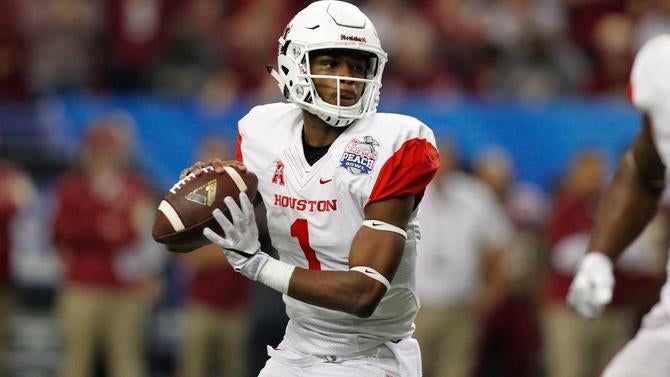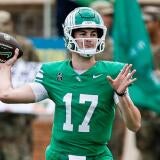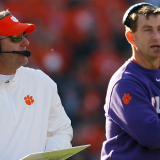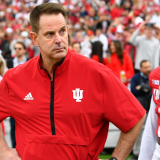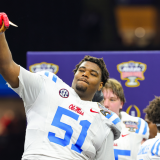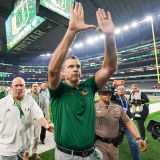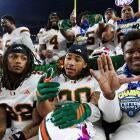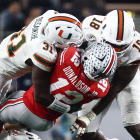
Why it's a shame that a Coastal Carolina story can't happen in college football
One of the coolest stories in sports just happened in college baseball, but can't in college football

One of the coolest college sports stories in some time just happened in baseball. It's a shame college football can't witness a feat like Coastal Carolina -- a public liberal arts university in Conway, S.C. with 9,615 undergrads -- defeating some of college baseball's biggest powers to win the College World Series.
Forget Cinderella showing up in college football. College football won't even let the mid-majors come to the dance.
In many ways, Coastal Carolina is not a Cinderella. It established itself as one of the premier mid-major baseball programs in the country long ago. Still, consistently making the NCAA Tournament is a far cry from winning a super regional at No. 8 LSU and then going to Omaha and knocking off No. 1 seed Florida, No. 5 Texas Tech, TCU twice and 2012 national champion Arizona twice.
The Chanticleers' surprising run made them the first to win the title in their College World Series debut since 1956. The Big South Conference captured its first national championship in any team sport. The Big South party was short-lived since Coastal Carolina officially joined the Sun Belt on Friday in order to move into the penthouse world of FBS football, where quotes like this aren't possible.
"We're not the most talented team in America, but we're the national champion," Coastal Carolina baseball coach Gary Gilmore told reporters Thursday. "This program has been a lot better than people gave it credit for, and they thought we were some small school from a small conference that couldn't get it done. This bunch wanted to prove everyone wrong."
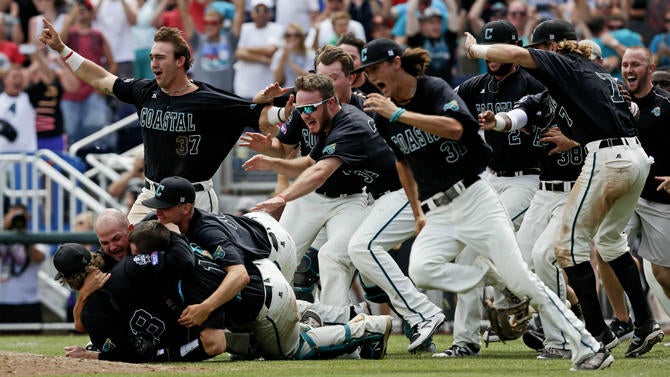
In every prominent NCAA sport except football, there's a chance for schools from smaller conferences to win it all. It may be unlikely to happen, but the only thing competitors want is a chance.
There's virtually no path for a football equivalent of Coastal Carolina baseball to reach the College Football Playoff. The new playoff system has made it harder for a team from the so-called Group of Five conferences to join the Power Five in the playoff.
Houston, which brought in $44.8 million of athletic revenue in 2014-15, could be an interesting test case in 2016. Potentially, Houston has the schedule for a Group of Five school to break through the Power Five playoff glass filled with $100 million-plus schools.
Granted, it's a long way from here to there for the Cougars, especially since they must replace a ton of experienced defensive backs. But it's an interesting question to ask: What would the playoff committee do if the Cougars go 13-0 with nonconference wins over Oklahoma and Louisville and if the American Athletic Conference produces quality opponents again?
"I don't know because nobody's told me," Houston coach Tom Herman said. "I think that's what the problem is with the system. Nobody knows what the criteria is for acceptance. One week it's strength of schedule, the next week it's game control. It changes week to week, year to year.
"I wish somebody could tell me, 'Hey, it's strength of schedule that matters most.' Fine, we'll schedule Oklahoma and Louisville every year. If they tell me it's going undefeated, great, I won't schedule Oklahoma and Louisville every year. We'll schedule wins -- the Baylor model. Until they define what the criteria is, I would probably say no, a non-Power Five school won't make the playoff."
American Athletic Conference commissioner Mike Aresco thinks going undefeated is the only current chance for a Group of Five school.
"Say they do beat Oklahoma and Louisville," Aresco said of Houston. "At that point, they would absolutely be in the playoff hunt and I think you and other people in the media would demand they would be. I think the fact they beat Florida State the way they did last year (in the Peach Bowl) would be a factor."
Wait, why should a result from 2015 factor into playoff consideration for 2016?
"I think psychologically it would be a factor," Aresco said. "(The committee) probably would argue it's not a factor and they always take every year separately. That would be the objective statement. But it's hard to argue if teams have success that it doesn't build on itself."
Coastal Carolina built itself into a respected baseball program over a number of years. The difference is, unlike the emergence of football underdogs at Houston, Boise State and TCU over the past decade, the Chanticleers could actually test themselves at the highest stage with everything at stake. For the longest time in football, a Group of Five bowl upset over a Power Five team got treated as the power program not caring about the game. Imagine trying that excuse in any other sport.
College football is not structured for underdogs. The sport hasn't had a team finish No. 1 that started unranked since Georgia Tech in 1990. In college football, a surprising run is when one of the most impactful players of his generation (Cam Newton) leads an SEC school awash in money (Auburn) to the national title.
Since football began playing a national championship game in 1998, this is how frequently non-Power Five schools (as currently aligned) have played for the national title in various sports:
| Men's ice hockey | 58 percent |
| Women's basketball | 31 percent |
| Men's soccer | 28 percent |
| Men's basketball | 22 percent |
| Women's soccer | 14 percent |
| Baseball | 11 percent |
| Women's volleyball | 8 percent |
| Softball | 3 percent |
| Football | 0 percent |
There is no incentive for the SEC, Big Ten, Big 12, ACC and Pac-12 to loosen their control over football playoff access and money. People don't offer to give up their power or risk diluting their valuable regular season. That's not how college football works, even if doing so might provide a sliver of hope for some smaller programs to stay relevant at a time when football participation rates are declining due to increasing knowledge about health risks associated with head injuries.
As it is, at least one Power Five conference gets left out of the playoff each year. The playoff will likely one day go to eight teams. There will be too much money and complaining about getting left out for it not to eventually happen. Once it does, there should be one less regular season game to reduce the grind on players, but I'm not holding my breath.
Nor would I assume that eight teams means a guaranteed spot for a Group of Five champion. At some point, the Group of Five may have to play its own championship game, but that could mean giving up significant money from the College Football Playoff. The only real path in football for Group of Five schools to compete for a national title is build your program up and beg a Power Five conference to add you. You're chasing fool's gold, but hey, you've got to spend the money on something since it can't go to the players.
Major college football is a different animal than anything else in the NCAA, which got overrun decades ago by conferences to control the sport's postseason. Thirteen of the 16 football programs that played for the national title since 1998 currently exceed $100 million annually in athletic revenue. Those 16 schools averaged $116 million in 2014-15.
Coastal Carolina had $20.9 million of athletic revenue in 2014-15 yet beat Arizona ($85.4 million) for the NCAA baseball title. Parity is easier with 11.7 scholarships in baseball compared to 85 scholarships in football. But it's also more manageable because, to varying degrees, other sports better embrace schools with different financial resources than football does.
Life will be much different for the Chanticleers when they start playing FBS football in 2018. College football's powers enjoy dancing with themselves. But thanks for asking.
